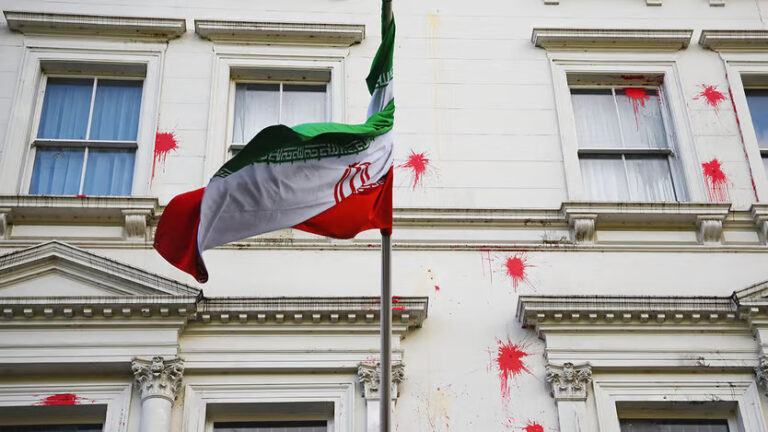SARA GHASEMILEE, Al Arabiya with Agencies
Syrian tanks and troops swept into two northwestern towns near the Turkish border on Wednesday, killing one 
person and wounding 13 according to activists, as Turkish Prime Minister Tayyip Erdogan said he expects Syrian reforms within 15 days. In the eastern city of Deir al-Zor, residents reported heavy gunfire as troops deployed across the provincial capital, making arrests and spraying pro-Assad slogans on buildings. Mr. Erdogan, a former close ally of Syrian President Bashar Al Assad, said his foreign minister had emphasized when he visited Damascus on Tuesday that the violence must cease.
“In Syria, the state is pointing guns at its own people,” he declared. “Turkey’s message to Assad is very clear: stop all kinds of violence and bloodshed.”
The Turkish leader said he hoped that Mr. Assad, confronting nearly five months of pro-democracy demonstrations, would take steps within 10 to 15 days towards promised political reforms.
Rights groups say 1,600 civilians have been killed since the uprising against Mr. Assad’s 11-year-rule erupted in March, making it one of the bloodiest upheavals in the Arab world this year.
Authorities say 500 soldiers and police have died.
Syria has barred most independent media since the unrest began, making it hard to verify conflicting reports by activists, residents and officials.
Already under Western sanctions, Mr. Assad faces growing international pressure to curb the bloodshed after three regional powers publicly called for change this week, leaving Iran as Syria’s only staunch remaining ally.
Sunni heavyweight Saudi Arabia condemned the violence and recalled its ambassador, while Egypt’s new government, which took office after Hosni Mubarak’s overthrow in February, said Syria was nearing “the point of no return.”
On Tuesday Turkey’s Foreign Minister Ahmed Davutoglu held more than three hours of talks with Assad.
A Turkish official said he called for “an end to bloodshed, withdrawal of the soldiers, the importance of having elections as soon as possible” and dialogue with the opposition.
In response, Mr., Assad said Syria “will not relent in pursuing the terrorist groups in order to protect the stability of the country and the security of the citizens … but is also determined to continue reforms,” Syria’s state news agency said.
Washington expressed disappointment at Mr. Assad’s comments and said US Secretary of State Hillary Clinton expected to talk to Mr. Davutoglu after his meetings in Syria.
“It is deeply regrettable that President Assad does not seem to be hearing the increasingly loud voice of the international community,” State Department spokeswoman Victoria Nuland said.
France also voiced dissatisfaction. “The time for delaying tactics is up. The Syrian authorities must respond to the legitimate aspirations of the Syrian people,” Foreign ministry spokeswoman Christine Fages said.
The Syrian Observatory for Human Rights said at least one woman was killed and 13 people were wounded when 12 tanks and armored vehicles, along with 10 large buses full of troops, entered the towns of Taftanaz and Sermin, around 30 km (19 miles) from the border with Turkey.
In nearby Binnish, rights campaigners said Syrian forces killed four villagers on Tuesday.
The protests against Mr. Assad, whose minority Alawite sect dominates power in Syria, were inspired by Arab revolts which overthrew leaders in Egypt and Tunisia earlier this year.
Last week Mr. Assad sent troops and tanks to quell the mostly Sunni Muslim city of Hama in central Syria and the army launched a similar assault on Sunday against Deir al-Zor, capital of an oil-producing province bordering Iraq’s Sunni heartland.
Witnesses said on Wednesday tanks and armored vehicles had spread across Deir al-Zor. They added that residents had reversed earlier pledges to resist any army assault by force.
“The inhabitants of Deir al-Zor have taken a collective decision not to resist, so as not to give excuses to the authorities to spread their propaganda about terrorists and armed groups,” one resident said.
He also said he saw troops spraying slogans on houses such as “Assad or no one”, “The people want the army to come in.”
Authorities have denied that any Deir al-Zor assault took place. They say they have faced attacks since the protests erupted in March, blaming armed saboteurs for civilian deaths.
Hama and Deir al-Zor are populated mostly by majority Sunnis and the crackdowns there resonate with their co-religionists who predominate in the Middle East and govern most Arab countries.
But as troops were reportedly deploying in Sermin, dozens of military vehicles packed with soldiers streamed out of the flashpoint protest hub Hama, after completing a 10-day operation.
“The army units have gone back to their barracks after having accomplished their mission, and residents, happy to be rid of the armed gangs who tried to sow discord among the population, have returned home,” a high-ranking army officer said.
That was confirmed by Turkey’s ambassador to Damascus who visited the city, Prime Minister Erdogan said.
“Our ambassador went to Hama and said that the tanks, security forces had started to leave Hama. This is highly important to show that our initiatives had positive results,” Mr. Erdogan said.
Troops backed by tanks stormed Hama on July 31, the eve of the Muslim holy month of Ramadan, to fight “armed groups,” killing 100 people in the single bloodiest day since the crackdown began, activists say.
The bloodshed triggered a deluge of international condemnation and prompted the UN Security Council, under pressure from European and US leaders, to issue a statement demanding an end to the violence.
Syrian authorities have blamed “outlaws,” “saboteurs” and “armed terrorist groups” for the violence that has swept Syria, while world powers have accused Syria of violently repressing pro-democracy protesters.







+ There are no comments
Add yours